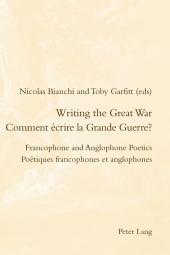 Neuerscheinungen 2017Stand: 2020-02-01 |
Schnellsuche
ISBN/Stichwort/Autor
|
Herderstraße 10
10625 Berlin
Tel.: 030 315 714 16
Fax 030 315 714 14
info@buchspektrum.de |

Nicolas Bianchi, Toby Garfitt
(Beteiligte)
Writing the Great War / Comment écrire la Grande Guerre?
Francophone and Anglophone Poetics / Poétiques francophones et anglophones
Herausgegeben von Bianchi, Nicolas; Garfitt, Toby
Neuausg. 2017. XIV, 366 S. 225 mm
Verlag/Jahr: PETER LANG LTD. INTERNATIONAL ACADEMIC PUBLISHERS 2017
ISBN: 1-78707-198-7 (1787071987)
Neue ISBN: 978-1-78707-198-8 (9781787071988)
Preis und Lieferzeit: Bitte klicken
For France the First World War was a war of national self-defence, but for Britain it was not. The essays collected in this bilingual volume, by a range of scholars working on both sides of the Channel, show that while the wider purposes of the war are striking for their absence in both French and British traditions, there are many common strands.
For France the First World War, or Great War, was a war of national self-defence, but for Britain it was not. Does that mean that French literary treatments of this unimaginably destructive war were very different from British ones? Not necessarily - but much can be learned from considering both traditions side by side, something that is rarely done.
The essays collected in this bilingual volume, by a range of scholars working on literature and history on both sides of the Channel, show that while the wider purposes of the war are striking for their absence in both French and British traditions, there are many common strands: realistic narratives of the trenches, humour as a safety-valve, imagination and creativity. Yet there are differences, too: for instance, there is plenty of French poetry about the war, but no real equivalent of the British "war poets". The volume looks at iconic figures like Owen, Brooke, Barbusse, Apollinaire and Proust, but also at a number of lesser known writers, and includes a study of "poetry of colour", recognising the active contribution of some four million non-Europeans to the war effort. The book includes a preface by the eminent war historian Sir Hew Strachan.
Engagée dans une guerre défensive sur ses frontières, la France connut une Grande Guerre bien différente de celle avec laquelle composèrent ses alliés britanniques. Faut-il en conclure que les deux nations furent amenées à produire des réponses au conflit radicalement différentes? Peut-on dégager des traditions nationales ou des tendances transnationales ouvrant la voie à des comparaisons encore rarement esquissées par la critique littéraire? C´est le pari des contributions de ce volume bilingue, réunissant autour de la question: "comment écrire la Grande Guerre?", les articles de spécialistes francophones et anglophones des domaines historique et littéraire. Il montre la variété des thématiques partagées par les deux traditions littéraires: récits réalistes des tranchées, usage de l´humour comme d´un exutoire salutaire, imagination et créativité; et souligne la présence de différences notables, comme l´absence de mythification en France de la poésie de 14, pourtant elle-aussi produite en masse tout au long de la guerre. L´ouvrage, tout en donnant une place de choix aux écrivains de premier ordre (Owen, Brooke, Barbusse, Apollinaire ou Proust), tente d´offrir quelque visibilité à un certain nombre d´auteurs moins connus, au nombre desquels des auteurs de couleur, à qui leur contribution à l´effort de guerre n´aura pas valu la reconnaissance littéraire attendue. La préface a été rédigée par Sir Hew Strachan, grand spécialiste de l´histoire de la période.
"La lecture de ce volume se recommande donc à plusieurs titres : pour les éclairages qu´apporte chacune de ses contributions mais, plus encore, pour les ouvertures auxquelles invite la perspective franco-anglaise dans lesquelles chacune d´elles trouve écho et fait sens."
(Denis Pernot, REVUE D´HISTOIRE LITTÉRAIRE DE LA FRANCE 2017)
Read the full review here
"This volume contains some fine essays that will interest and inform both historians and literary critics of First World War writing." (Alison S. Fell, French Studies)


